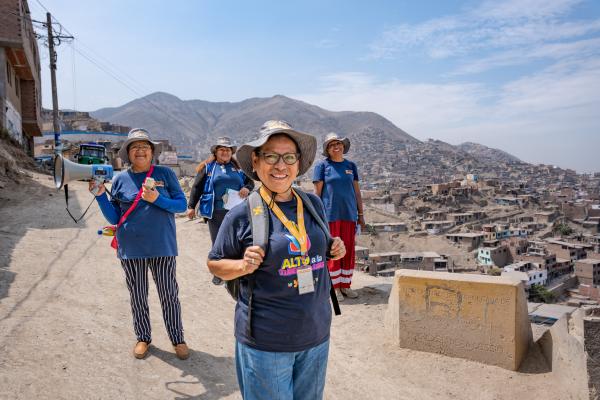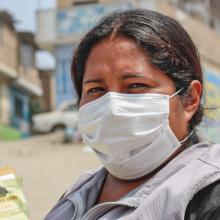Since the 1990s, Socios En Salud (SES) has been committed to a model of care focused on community accompaniment. Along this path, the Community Health Agents (ACS) have played a key role in bringing the healthcare system closer to those who need it most. They not only guide and support, but also care, listen and build bridges in contexts marked by exclusion or vulnerability.
HCAs are people from the community, trained to carry out health promotion and disease prevention activities, health accompaniment, and who have a strong commitment to improving the health situation in their communities. They know the territory, the needs of the families and the obstacles to access timely care. Thanks to their work, thousands of people have been able to continue treatment, detect illnesses in time and recover their wellbeing.
However, despite their crucial role, current Peruvian law considers their work as voluntary. Today, SES is promoting a legal reform that seeks to recognize them as workers in the health system, with rights, protection and continuous training. A measure that strengthens not only their dignity, but also the country’s public health.
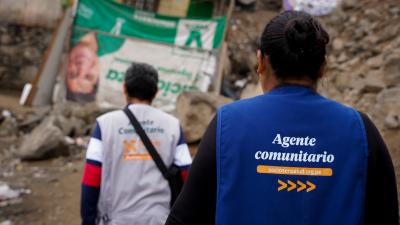
En 2024, Socios En Salud tuvo 94 agentes comunitarias de salud (ACS) activas, cuyo trabajo fue fundamental para brindar un acompañamiento cercano y constante a las personas que enfrentan desafíos de salud.
Foto de SES
Recognition with justice: the proposal for change
Law No. 30825, in force since 2018, recognizes the importance of ACSs, but defines them as volunteers without economic compensation or working conditions. For Socios En Salud, this does not reflect the reality or the value of their work. For this reason, together with other civil society organizations, it is actively involved in pushing for an amendment that would give them the place they deserve.
“Community accompaniment cannot continue to be an informal and unprotected effort. We need the state to legally recognize ACSs and guarantee dignified conditions for those who care for others,” says Helen Marin, head of the Advocacy and Community Outreach Unit at Socios En Salud. “It’s not just about labor justice: it’s about public health, it’s about trust, it’s about continuity of care from the ground up.”
The ruling approved in the Congressional Health Commission in April 2025 includes key proposals: incorporating ACSs as workers in the system, establishing a monthly remuneration equivalent to the minimum wage, guaranteeing continuous training with official certification, protecting their health and ensuring the provision of implements. It is also proposed that the State assume responsibilities as employer, including coverage in case of health affectation or death.
For Dr. Magaly Blas, director of the organization Mamás del Río, the collective impulse is fundamental: “Alliances between organizations are vital because together we can promote change. I salute the organization of civil society, thanks to SES, Mamás del Río, UPCH, ForoSalud, Future Generations and PAHO. Together we have formed an alliance that is already generating concrete transformations for the country’s ACS.”
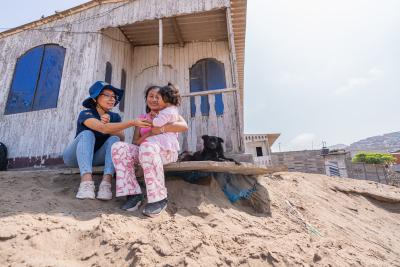
La agente comunitaria Verónica Mondragón acompaña a Dina Bustilles y su hija como parte de una iniciativa del programa de Salud Materno Infantil y Adolescente de Socios En Salud.
Foto de Diego Diaz / SES
Training, well-being and visibility: the SES model
Socios En Salud has not waited for a law to act. For years, it has been implementing good practices that today can serve as a national model. One example is the SES Scholarship, which since 2020 has allowed community agents to access technical studies in health, with academic accompaniment and psychosocial support. This initiative seeks that ACS can continue to develop and have better job opportunities.
The organization also offers ongoing training, such as the Basic Helping Skills virtual course, and implemented since 2024 a group and face-to-face psychoemotional intervention for ACSs, recognizing the emotional impact of their work. In addition, SES celebrates ACS Day and guarantees financial compensation, even though it is not required by law.
“Every ACS we train, accompany and recognize is an investment in the well-being of his or her community. The model works, and we have proven it. What is missing now is a legal framework that allows us to scale this experience nationally,” Marin explains.
These actions have shown concrete results in health and well-being. Formalizing these mechanisms through a law would allow scaling their impact and ensure long-term sustainability.
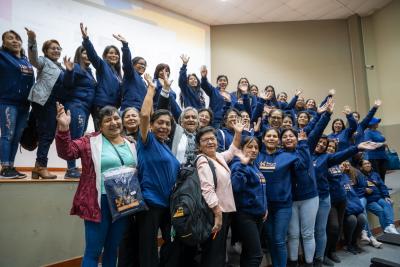
Cada año, en Socios En Salud celebramos el Día del Agente Comunitario de Salud con un evento central que se desarrolla la primera semana de junio.
Foto de Julio López / SES
Why supporting the law strengthens public health?
Socios En Salud argues that recognizing ACSs as workers in the health system is a historical debt and a strategic bet. For years, the role of community agents has contributed to filling the human resource gap in primary health care. Their work has made it possible to improve adherence to treatment in people with tuberculosis or HIV, detect cases in early stages, reduce stigma in mental health and strengthen access to maternal and child programs or state social programs, among other achievements.
Experience shows that when ACSs have decent conditions, their impact grows. For this reason, SES considers that approving the amendment of Law No. 30825 is a political opportunity that should not be missed. Doing so would send a powerful message: that the country recognizes the value of community work, and is willing to invest in those who sustain health from the territory.
“This law can mark a before and after. Not only for ACSs, but for the thousands of people who rely on them. Recognizing their role is to ensure the right to health in the communities themselves,” Marin concludes.
Caring for the caregiver is also caring for everyone’s health.
